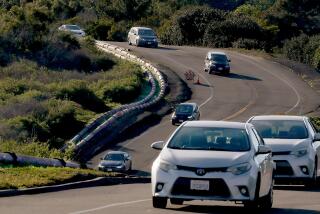Peninsula City Charged With Killing Butterfly
A federal misdemeanor charge was filed Thursday against the City of Rancho Palos Verdes, charging that it eradicated the endangered Palos Verdes blue butterfly by developing a baseball field on the larvae’s habitat.
The city is the first public agency charged with violating the federal Endangered Species Act of 1973, according to Assistant U.S. Atty. Manuel Medrano. Arraignment is set for April 13. The city faces a fine of up to $20,000 if convicted.
Unique to the Palos Verdes Peninsula, the blue butterfly has been listed as an endangered species since 1980 and has not been seen since 1983, when the Fred Hesse Park baseball field was completed, Medrano said.
He said the butterflies, which had only been discovered by scientists in 1977, had been feeding off locoweed that grew wild on what had been vacant land.
The U.S. attorney’s office in Los Angeles began its investigation in 1984, and Medrano declined to say why the federal government waited until now to file its charge.
‘We Are Not Guilty’
Medrano said the city was given an offer in January to dispose of the matter but did not respond.
Medrano would not say what the terms of the offer were, but Rancho Palos Verdes Mayor Pro Tem Bob Ryan said, “We had an offer to plead guilty and pay a $20,000 fine.
“We are not guilty,” Ryan said, adding that he has never seen any of the blue butterflies. “To say the city intentionally destroyed this butterfly is criminal.”
The discovery of the lost butterfly habitat triggered a round of finger-pointing among environmentalists, Rancho Palos Verdes officials and the U.S. Fish and Wildlife Service, which has the legal duty to protect the insect.
Ryan said the city was never notified exactly where the U.S. Fish and Wildlife Service had set its habitat boundaries because they were afraid people would go there to take the butterflies. Environmentalists said a three-year building boom in the city decimated its locoweed patches and accused the Wildlife Service of doing nothing to stop it.
Wildlife Service officials denied ignoring the situation, saying there was a breakdown of communication between city and federal officials.
Ryan said the U.S. government’s charge is putting a financial burden on the city.
“This is going to cost the city at least $20,000 just to defend itself,” he said. “It’s not silly that the butterflies were harmed; what is silly is this process.”
More to Read
Sign up for Essential California
The most important California stories and recommendations in your inbox every morning.
You may occasionally receive promotional content from the Los Angeles Times.










